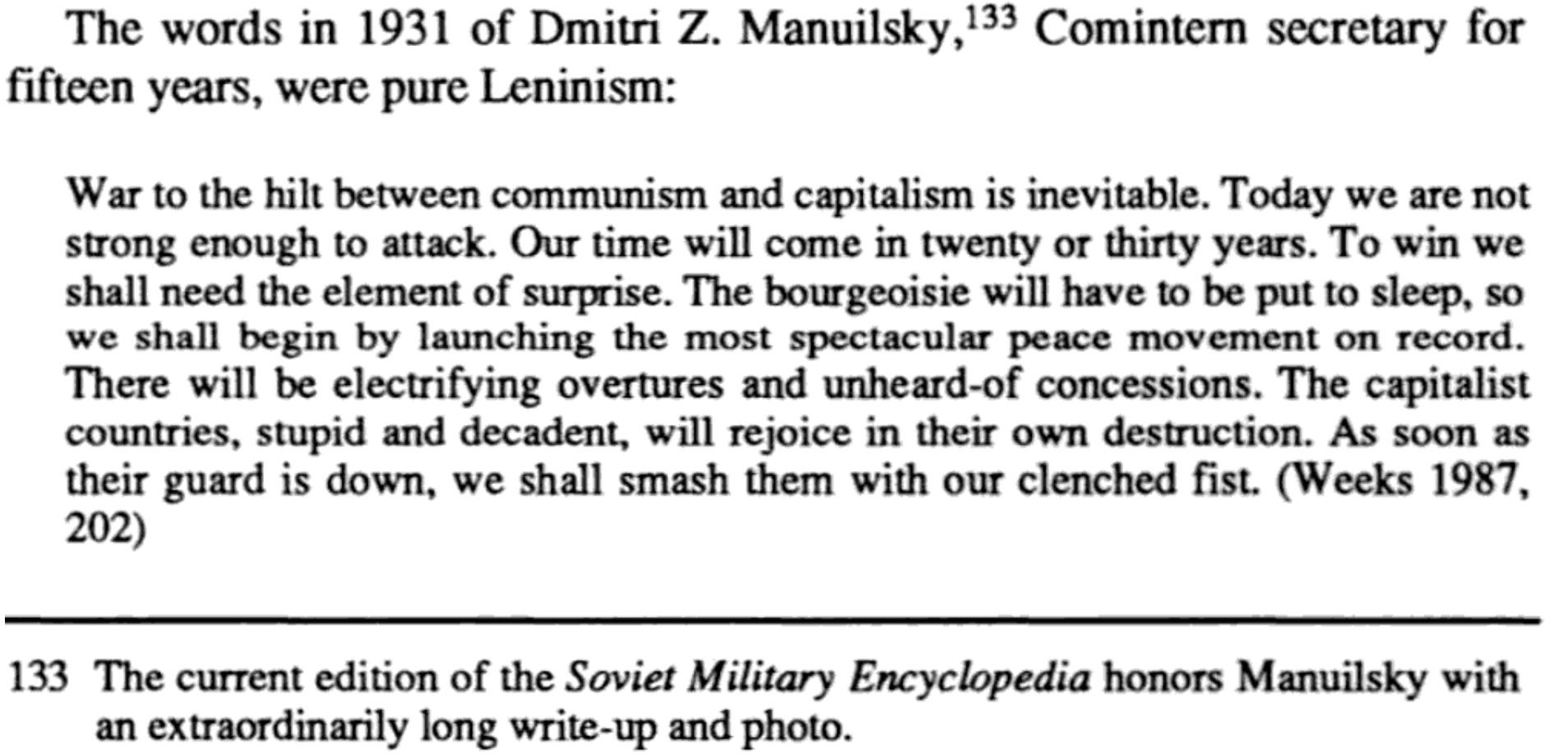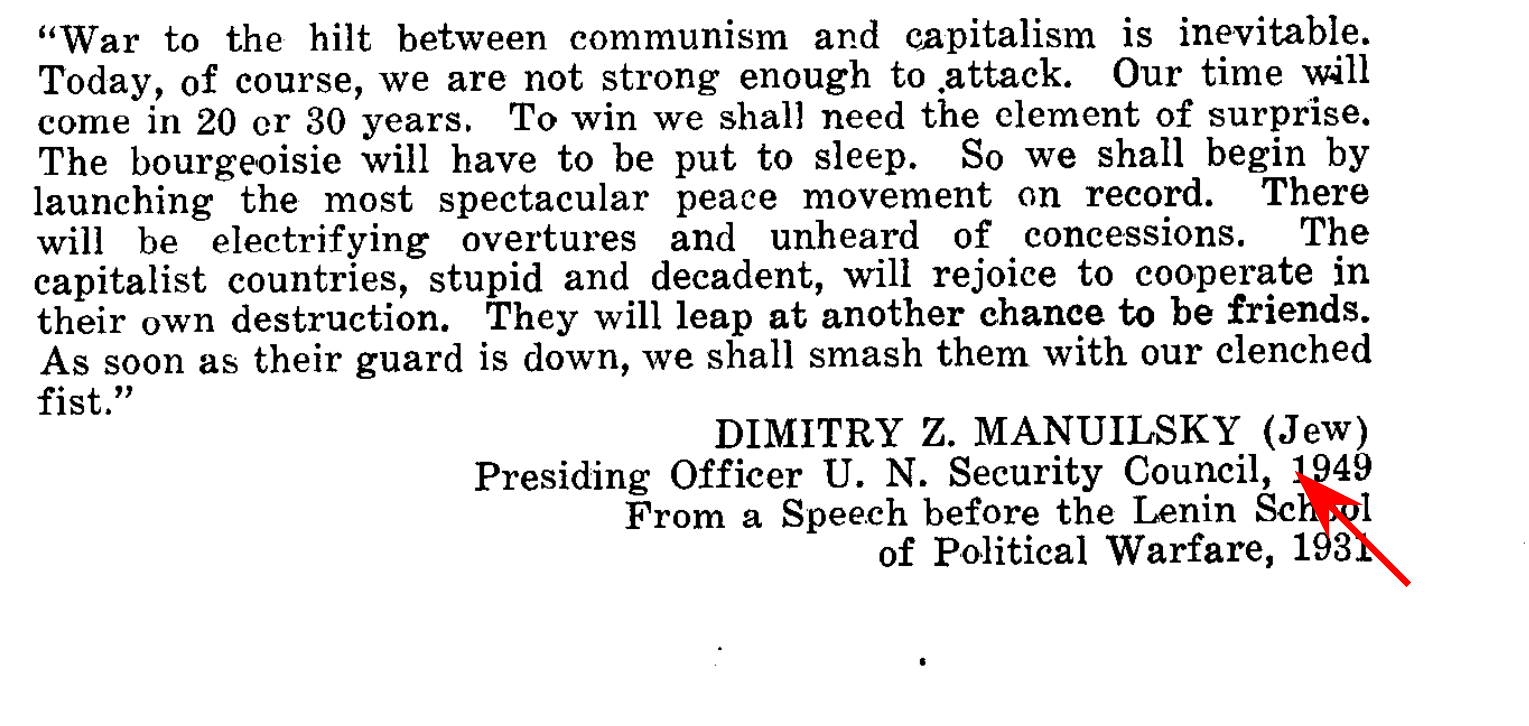Manuilsky Hoax
Updated: November 24, 2019

Occasionally, while skimming sources, you may find a quote like this, from the book The Long Pretense: Soviet Treaty Diplomacy from Lenin to Gorbachev. I don't know why you're reading it, but let's say you are.
War to the hilt between communism and capitalism is inevitable. Today we are not strong enough to attack. Our time will come in thirty or forty years. To win, we shall need the element of surprise. The bourgeoisie will have to be put to sleep. So we shall begin by launching the most spectacular peace movement on record. There shall be electrifying overtures and unheard-of concessions. The capitalist countries, stupid and decadent, will rejoice in their own destruction. As soon as their guard is down, we shall smash them with our clenched fist.
Many students these days do not know the story of the Soviet Union and the U.S. during the Cold War. But the narrative here is familiar. The Soviet Union is trying to lull us into sleep before an attack.
There was some truth to this idea. Not necessarily around attacking the West. But the Soviets did start and fund a worldwide peace movement that was intentionally designed to get the West to disarm voluntarily.
The quote in this book however, goes way beyond that, speaking to a deliberate long-term plan for attack. Is it true? Did Manuilsky -- a high-ranking Soviet official -- really say this?
The Problem of Search Term Bias
Our first thought might be to search for the quote itself. And if the quote is real, this will work. But if it is fake (and spoiler alert, this one is fake) something odd can happen.
In this case, if you search on the quote itself (or a small part of it) you get a lot of results But think for a moment about the problem here.

If the quote is real, it will lead us to a good source. But if the quote is fake, it's possible that the only pages using it are written by people duped by it. So one thing we're looking at as we scan a SERP is whether any of the sources we see are recognizable to us, or whether it's an odd collection of sites.
So we add a couple terms here to check the inverse possibility. And what we're trying to see is if a source that says this quote is fake is more reliable than sources that say it is real. Here we add the terms fake and quote.
This book looks interesting. Be very careful with books -- there's a lot of junk out there. But this is worth a click, since it is a book on exactly this question of whether quotes are fake or real.

The book says the quote is fake and the context given to the quote is impossible -- the place the quote was supposedly spoken doesn't actually exist.

If we click "About this Book" we can get more information about this book.

In this case the book is from Oxford University Press -- a highly reputable publisher. The book is a bit old, but for this purpose that's probably OK.

One thing to note here -- when we looked on the web there were dozens of sites that said this quote was real and one that said it wasn't. But that doesn't matter, because the one source that says it didn't happen is of high quality and the other sources are of low quality.
This can be hard for students (and
teachers!) to understand sometimes. I've even heard teachers
say things along the line of "If you see it in three places
its true."
It's true that more sources are better (we love consensus!) But you seeing it in one highly reliable source is worth more than seeing it in hundreds of fringe sites. And for such an important quote (essentially a declaration of a secret war) we should expect high quality sources.
A Bit More on the Hoax
If this one felt a bit hard, it was. The Manuilsky Hoax was widely disemminated throughout conspiracy-believing elements of the hard right in the U.S. during the Cold War. Like a lot of conspiracy theory, it had a grain of truth to it -- the support of the U.S.S.R. for peace movements, for example, was largely strategic -- something easily demonstrated by the fact that they spent money supporting peace movements only in countries with which they had an enemity, and launched their anti-nuclear campaigns while aggressively pursuing nuclear weapons.
The hoax even decieved no less a public figure than Eleanor Roosevelt, wife of FDR, who learned it from reading an opinion column from a professor from Ricks College in Idaho.
This is important for a number of reasons, but one of the biggest reasons is by creating this quote a very hard-right faction was able to portray all peace activists as hopelessly naive and decieved fools. In turn, this reduce the possibility of peace activists and others of finding middle ground. Who wants to compromise with a set of fools?
Quote-Mongering and Contextomy
Abraham Brumberg, a Soviet specialist, called this sort of practice "quotation-mongering", a practice that took a position and then sought to find or create quotes to support it. Often quote-mongers will assign quotes to more prestigious speakers, or engage in what Milton Mayer called contextomy, the deceptive stripping of context from quotes.
Once a deceptive or fake quote gets a foothold, it's hard to root it out. With each use, a deeper texture of search results and sources build up. If you go to find a source for a quote and find a lot of odd sites, but nothing that's definitive, take a minute and check it out.
Additional Notes
It's worth noting that quote site azquotes has the fake quote on it's site. Quote sites are notoriously unreliable.
While Manuilsky was no saint, the use of his name in the hoax is probably not accidental, as its Jewishness served the needs of right-wing antisemitic groups of the time. Unable to leave it to subtext, this 1950s white nationalist book points it out specifically.

Antisemitism is still often a feature of conspiracy theories,
although various dogwhistle terms are used.